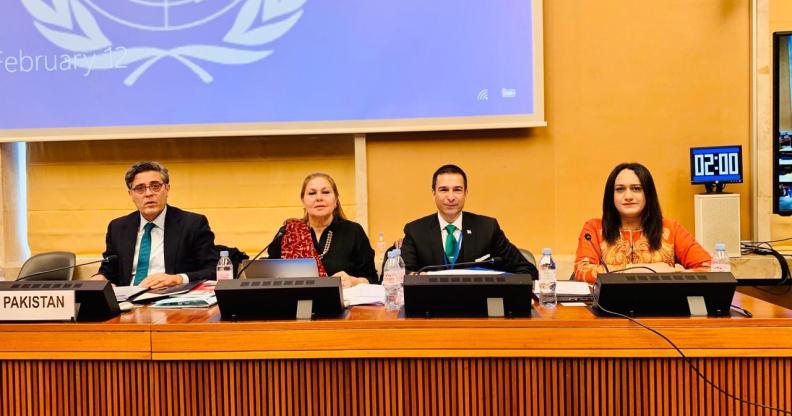Trans woman makes history representing Pakistan at United Nations

Aisha Mughal (R) at the United Nations convention (Twitter)
A woman from Pakistan has become the first openly trans person to take part in a United Nations convention on violence against women in Geneva.
Aisha Mughal, who works with the Ministry of Human Rights in Pakistan, was one of the country’s delegates at the UN Convention on the Elimination of all Forms of Discrimination against Women (CEDAW).
The delegation was led by the country’s Ministry for Human Rights, which also completed a review of Pakistan’s 5th Periodic UN CEDAW Report.
Trans rights expert Aisha Mughal praises Pakistan for progress.
Writing on Twitter following the convention, Mughal praised her country for giving her a place at the table.
“I am really grateful to my boss for believing in me and for making me part of Pakistan’s Government delegation to UN CEDAW,” Mughal wrote.
“I acknowledge the efforts of my government for mainstreaming the transgender community of Pakistan.”
I am really grateful to my boss @RabiyaJaveri for believing in me and for making me part of Pakistan's Government delegation to UN CEDAW. I acknowledge the efforts of my government for mainstreaming the transgender community of Pakistan. 🇵🇰♥️ pic.twitter.com/QpMlQJwIrp
— Aisha Mughal (@_aishamughal) February 15, 2020
Speaking to SAMAA TV, Mughal said: “Many transgender women have attended these conventions before but they were representing civil societies.”
“This was the first time a transgender was a member of a government delegation.”
I acknowledge the efforts of my government for mainstreaming the transgender community of Pakistan.
She praised her country’s record on trans rights, saying: “Pakistan has become an example for the entire world.”
“With all the support from the government, I feel proud to be a Pakistani transgender woman.”
The country recently introduced free healthcare for transgender people.
Mughal’s achievement comes just weeks after Pakistan extended free healthcare to trans people in a landmark move.
All trans people in Pakistan will now be eligible for free medical treatment, including transition-related care.
The government is giving trans people a special health card that will give them access to an existing government health insurance scheme, which was introduced in 2015 to provide health cards for those earning less than $2 a day, although trans people will not face that financial test.
Prime minister Imran Khan said that his government was “taking responsibility” for trans people, who say they are routinely denied treatment and can face harassment or ridicule from hospital staff and patients.
It also plans to set up separate hospital wards for trans patients, according to Dr Zafar Mirza, a special aide to Khan for health services.

